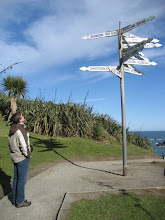2007-02-03
2007-01-28
Reading The Omega Diet (2007-01-09/28)
Everyone I know seems to have a different approach to nutrition: Atkins, Mediterranean, Nourishing Traditions, South Beach, etc. Each has a different approach to carbohydrates, monounsaturated fats, saturated fats, milk products, fiber, etc. Each cites research in a controversial field.
I need to have healthy diet and exercise (although there appears to be more consensus on the latter). I'd like to have the metabolism of my last decade. The various contrary opinions confuse me, however. Which diet would be best for me?
Imagining that it would be better to have some plan than none at all, I selected the diet in a book my doctor recommended to me during a recent routine checkup: The Omega Diet: The Lifesaving Nutritional Program Based on the Diet of the Island of Crete by Artemis P. Simopoulos, M.D. The American Heart Association Dietary Guidelines: Revision 2000 has some similarity to this diet.
The Omega Diet, based on the traditional diet of Crete, attempts to mimic the characteristics (particularly the ratio of omega-6 to omega-3 essential fatty acids) of the diet on which human beings evolved. Below are "The Seven Dietary Guidelines of The Omega Diet":
Breakfast
Lunch
Dinner
I need to have healthy diet and exercise (although there appears to be more consensus on the latter). I'd like to have the metabolism of my last decade. The various contrary opinions confuse me, however. Which diet would be best for me?
Imagining that it would be better to have some plan than none at all, I selected the diet in a book my doctor recommended to me during a recent routine checkup: The Omega Diet: The Lifesaving Nutritional Program Based on the Diet of the Island of Crete by Artemis P. Simopoulos, M.D. The American Heart Association Dietary Guidelines: Revision 2000 has some similarity to this diet.
The Omega Diet, based on the traditional diet of Crete, attempts to mimic the characteristics (particularly the ratio of omega-6 to omega-3 essential fatty acids) of the diet on which human beings evolved. Below are "The Seven Dietary Guidelines of The Omega Diet":
I conclude with a sample day on the Omega Diet (not including healthy snacks ):
- Eat foods rich in omega-3 fatty acids such as fatty fish (salmon, tuna, trout, herring, mackerel), walnuts, canola oil, flaxseeds, and green leafy vegetables. Or, if you prefer, take omega-3 supplements.
- Use monounsaturated oils such as olive oil and canola oil as your primary fat.
- Eat seven or more servings of fruits and vegetables every day.
- Eat more vegetable protein, including peas, beans, and nuts.
- Avoid saturated fat by choosing lean meat over fatty meat (if you eat meat) and low-fat over full-fat milk products.
- Avoid oils that are high in omega-6 fatty acids, including corn, safflower, sunflower, soybean, and cottonseed oils.
- Reduce your intake of trans-fatty acids by cutting back on margarine, vegetable shortening, commercial pastries, deep-fat friend food, and most prepared snacks, mixes, and convenience food.
Breakfast
- 1 bagel
- 2 oz lox (cold-smoked salmon)
- 2 T low-fat cream cheese or 3 T low-fat cottage cheese
- Tomatoes, sliced onions, or capers
- 8 oz. juice
Lunch
- 2 cups vegetable soup
(Hot and Sour Soup) - 5 crackers (nonfat or canola-based)
- 1 cup mixed green salad with 2 T olive oil vinaigrette
Dinner
- Lean burger
(5 oz. lean meat or veggie patty, 1 whole-wheat hamburger bun or roll, 1 T. canola oil mayonnaise, lettuce and tomato) - 3/4 cups cooked carrots marinated in 1 T. olive oil vinaigrette (served cold)
Subscribe to:
Comments (Atom)
